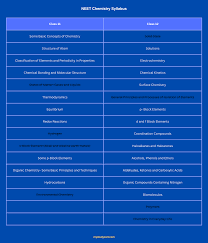National Eligibility cum Entrance Test (NEET) Syllabus for 2025 will be published on the official website of the National Testing Agency (NTA). Candidates will be able to obtain the NEET 2025 Syllabus PDF from the link provided in this article.

Table of Contents
NEET 2024 Syllabus
The NEET 2024 syllabus, crucial for shaping your exam strategy for NEET 2025, is expected to mirror that of 2024. The syllabus was recently updated twice by the NMC for the 2024 NEET exam, aligning it with changes made to various education board syllabi following the adoption of the National Education Policy (NEP).
Physics section of the NTA NEET 2025
The Physics section of the NTA NEET 2025 syllabus holds a 25% weightage in the exam. Because it is conceptually demanding, students should begin preparing with the standard physics syllabus for NEET. The NEET Physics syllabus for 2025 includes topics from both class 11 and class 12 NCERT textbooks. The updated syllabus for NEET 2025 Physics is detailed here. It is recommended to thoroughly cover the physics portion to enhance scores in the undergraduate exam.
NTA NEET Syllabus 2024 for Chemistry
| Overview of NEET Chemistry Syllabus | |
|---|---|
| Section | The Chemistry section of the NEET exam is known for being highly scoring. To excel in this section, students should adhere to the standard syllabus outlined by NTA. Chemistry contributes 25% of the questions and marks in the NEET exam, divided into three domains: Physical Chemistry, Inorganic Chemistry, and Organic Chemistry. |
| NEET Physical Chemistry Syllabus |
|
| Inorganic Chemistry Syllabus for NEET |
|
| NEET Organic Chemistry Syllabus |
|
NEET 2025 Biology Syllabus?
| Overview of NEET 2025 Biology Syllabus | |
|---|---|
| Section | The NEET 2025 Biology syllabus constitutes 50% of the exam’s questions and marks, making it crucial for students to achieve high scores. It covers fundamental areas from both classes 11 and 12: |
| Class 11 Topics |
|
| Class 12 Topics |
|
NEET Biology Syllabus for 2025 (Removed Portions)
Class 11Unit I: Diversity in Living World
|
Class 12Unit I: Reproduction
|
NEET Physics Syllabus - New Additions
| Unit II: Kinematics | Resolution of Vector |
| Unit VI: Gravitation | Motion characteristics of a satellite, including time period and energy considerations. |
| Unit VII: Properties of Bulk Matter/Properties of Solids and Liquids | Fluid pressure due to a column of fluid; Applications of Pascal’s law. Influence of gravity on fluid pressure. |
| Unit IX: Behavior of Perfect Gas and Kinetic Theory | Root mean square (RMS) speed of gas molecules: Degrees of freedom. Avogadro’s number. |
| New Topics Added from Class 12 Physics Syllabus: | |
| Unit III: Magnetic Effects of Current and Magnetism | Impact of temperature on magnetic properties. |
| Unit VII: Dual Nature of Matter and Radiation | Understanding the dual nature of radiation. |
| Unit XX: Experimental Skills |
|
How you can access and effectively use the NEET 2025 Syllabus.
To access the NEET 2025 syllabus, candidates are advised to visit the official National Testing Agency (NTA) website and download the syllabus in PDF format. Alternatively, they can also view and download the complete syllabus from this page.
Once obtained, students should thoroughly review the syllabus to understand the full scope of the exam’s content. Aspiring candidates should integrate the syllabus into their study schedules, ensuring that their study materials and practice questions cover the specified topics.
Effectively using the syllabus involves breaking down each subject into manageable sections, scheduling regular review sessions, and focusing on areas that have been highlighted as new additions or changes.
